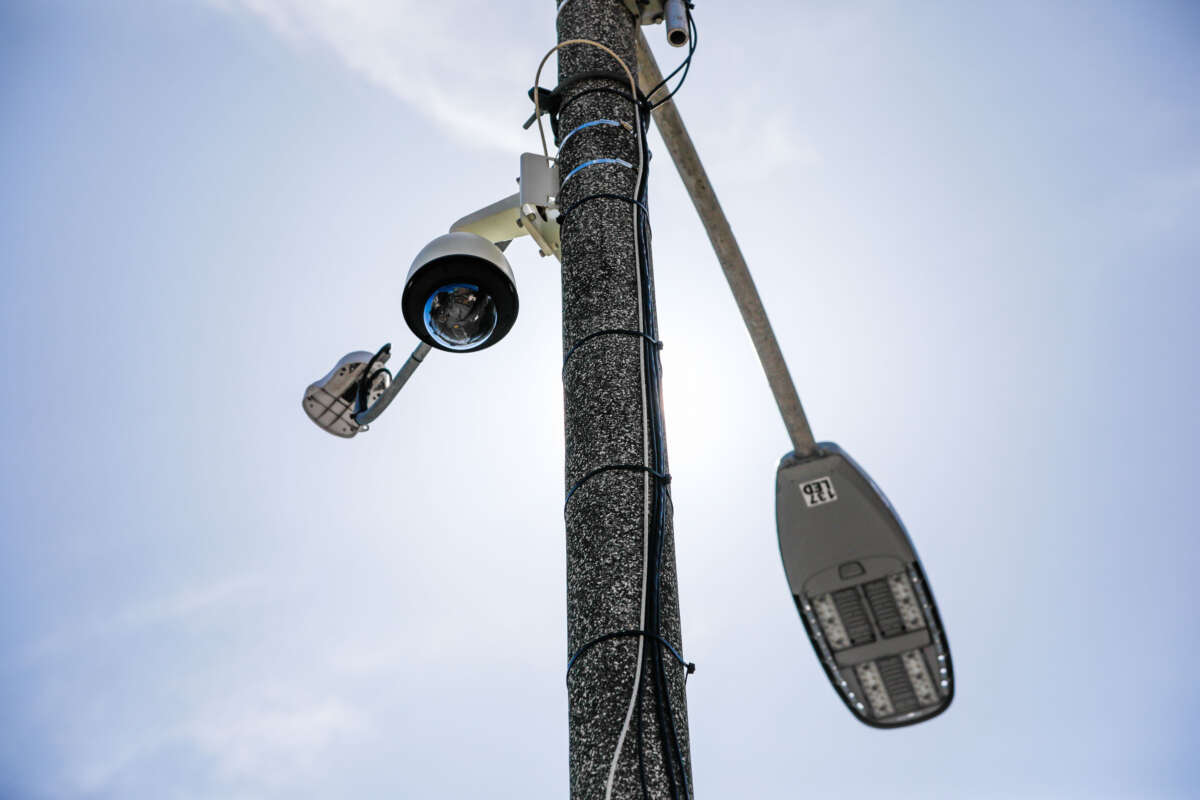Support justice-driven, accurate and transparent news — make a quick donation to Truthout today!
In a letter sent to the Department of Justice (DOJ) on Thursday, a group of Democratic senators demanded that the agency review how police use facial recognition and other biometric technologies and whether the use of such tools are in violation of federal civil rights laws.
“We are concerned that the use of certain forms of biometric technology, such as facial recognition technology, may potentially violate Title VI of the Civil Rights Act of 1964, which prohibits ‘discrimination under any program or activity receiving Federal financial assistance,’ based on “race, color, or national origin,” the Senators wrote to Attorney General Merrick Garland.
The letter’s signatories include Senators Raphael Warnock (D-Georgia), Dick Durbin (D-Illinois), Chris Van Hollen (D-Maryland), John Fetterman (D-Pennsylvania), Ben Cardin (D-Maryland), Peter Welch (D-Vermont), Jeff Merkley (D-Oregon), Tina Smith (D-Minnesota), Laphonza Butler (D-California), Elizabeth Warren (D-Massachusetts), Alex Padilla (D-California), Brian Schatz (D-Hawaii), Ed Markey (D-Massachusetts), Cory Booker (D-New Jersey), Ron Wyden (D-Oregon), Bernie Sanders (I-Vermont), Gary Peters (D-Michigan) and Mark Kelly (D-Arizona).
The DOJ had awarded at least $3.2 million to local law enforcement around the country for facial recognition software since 2007, despite numerous studies finding that such software is racist and results in false arrests.
“Numerous studies, including one co-authored by a Federal Bureau of Investigation (FBI) scientist and another by the National Institute of Standards and Technology (NIST), have established that facial recognition technology is less accurate when analyzing dark-skinned faces,” the letter says. “We are deeply concerned that facial recognition technology may reinforce racial bias in our criminal justice system and contribute to arrests based on faulty evidence.”
The senators’ letter asks the DOJ to respond to eight questions about whether the deployment of these technologies potentially violate the Civil Rights Act of 1964 or other federal civil rights laws and whether the agency is effectively overseeing the use of these biometric technologies.
“This letter is more urgent than ever as police departments around the country accelerate their deployment of facial recognition,” said Surveillance Technology Oversight Project (S.T.O.P) Communications Director Will Owen. “But we have no doubt this broken, biased software violates civil rights. There is no defending or fixing facial recognition, which is why Congress must go further by banning its use in policing altogether.”
Not only does the American Civil Liberties Union (ACLU) say that facial recognition technology “is known to produce biased and inaccurate results, especially when applied to people of color,” but there is also evidence that police departments use these technologies disproportionately on Black people. For instance, as per a 2023 Politico report, data from the police department in New Orleans revealed that “nearly every use of the technology from last October to this August was on a Black person.” Racist misidentification by facial recognition have led to at least six publicly known cases where Black people were falsely arrested based only on an incorrect facial recognition match.
This letter to the DOJ is part of a larger effort by Congress to reign in facial recognition and other biometric technologies. In November, Senators introduced the Traveler Privacy Protection Act, bipartisan legislation that would ban involuntarily facial recognition screening at airports. This bill has been referred to the Senate’s Commerce, Science, and Transportation Committee and is supported by The Electronic Privacy Information Center (EPIC), the ACLU, and S.T.O.P.
“The TSA program is a precursor to a full-blown national surveillance state. Nothing could be more damaging to our national values of privacy and freedom. No government should be trusted with this power, Sen. Jeff Merkley (D-Oregon) said.
Merkley, who has prioritized privacy in his congressional policies, was also among the signatories of the letter to the DOJ. In March, Merkley and other progressives in Congress also reintroduced the Facial Recognition and Biometric Technology Moratorium Act, a bill that would ban the government from employing biometric technologies such as voice and gait recognition, which was used to arrest protesters during the George Floyd protests in 2020. This bill was referred to the Committee on the Judiciary for review.
Writing for Truthout, abolitionist James Kilgore argued that resolving the problems with policing technologies “won’t come from merely attacking the inaccuracies or racial bias baked into modern surveillance and policing”:
Many of these technologies simply have no place in a world that respects life. Databases have many uses, especially in tracking climate change or air quality, but only if informed by a social justice framework that is not driven by profit nor dogmatic paradigms that either deify or totally reject technology.
We remain a long way from putting such frameworks in place. At a moment when the cutting-edge of technology and surveillance and the world’s political acumen are trained on Gaza, a tiny strip of land which is perhaps the ultimate laboratory for these technologies, building that framework looms all the more urgent.
A terrifying moment. We appeal for your support.
In the last weeks, we have witnessed an authoritarian assault on communities in Minnesota and across the nation.
The need for truthful, grassroots reporting is urgent at this cataclysmic historical moment. Yet, Trump-aligned billionaires and other allies have taken over many legacy media outlets — the culmination of a decades-long campaign to place control of the narrative into the hands of the political right.
We refuse to let Trump’s blatant propaganda machine go unchecked. Untethered to corporate ownership or advertisers, Truthout remains fearless in our reporting and our determination to use journalism as a tool for justice.
But we need your help just to fund our basic expenses. Over 80 percent of Truthout’s funding comes from small individual donations from our community of readers, and over a third of our total budget is supported by recurring monthly donors.
Truthout has launched a fundraiser, and we have a goal to add 273 new monthly donors in the next 72 hours. Whether you can make a small monthly donation or a larger one-time gift, Truthout only works with your support.
